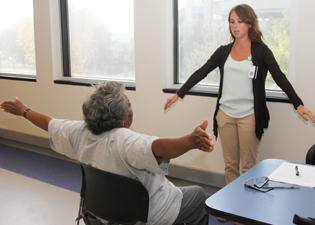Rehabilitation and Participation Science
Program in Occupational Therapy
 Following a few changes made during the summer break, the student-run stroke clinic, launched late last year, has more than just a new home beginning this semester; it also has a stronger operational foundation within the Program. Now housed in the new Community Practice clinic located on the second floor of the 4444 Forest Park Avenue building, and under new leadership oversight, the stroke clinic offers a unique opportunity for students to gain hands-on experience in a real-world environment, extending beyond the role that fieldwork plays in preparing students for practice.
Following a few changes made during the summer break, the student-run stroke clinic, launched late last year, has more than just a new home beginning this semester; it also has a stronger operational foundation within the Program. Now housed in the new Community Practice clinic located on the second floor of the 4444 Forest Park Avenue building, and under new leadership oversight, the stroke clinic offers a unique opportunity for students to gain hands-on experience in a real-world environment, extending beyond the role that fieldwork plays in preparing students for practice.
Planning for the clinic began two years ago when OTD students Kerry Ball, OTD/S ’16, Brian Goedde, OTD/S ’16, and Sadie Walker, OTD/S ’16, developed the initial business plan for their OTD project. Former faculty member Rebecca Birkenmeier, OTD, OTR/L, served as mentor of the project for the first two years, until she left the Program late last summer. “Our goal was to build the clinic into not only what Dr. Birkenmeier initially envisioned, but also a place for students to hone their clinical skills and prepare for their respective fieldworks,” shares Goedde. The students divided the work, each taking responsibility for a specific piece of the plan. Goedde focused on the infrastructure for the clinic, including funding and marketing; Walker directed her efforts toward integrating their proposal into the curriculum so that it would create a sustainable model year-after-year; and Ball developed an evidence-based, standardized assessment battery and protocol for the clinic. According to Walker, collaboration has been the key to success throughout the planning. “Although we have ‘separate’ projects, we really work together and collaborate about each other’s piece as well, because it all has to fit together in the final product.”
Following Birkenmeier’s departure, the students transitioned to working with Pat Nellis, MBA, OTR/L, director of clinical operations, to establish a solid framework for continued growth and development. In addition to Nellis, Alex Wong, PhD, DPhil, BSOT, and Meghan Doherty, MSOT, OTR/L, will also serve as mentors for the third-year OTD students, each bringing their expertise to the planning table. “There is not enough praise I can offer for what Pat Nellis has done for us and this clinic,” says Goedde. “She has been an enormous resource in our doctoral projects and the upbringing of the clinic, and is an essential piece in this venture.”
The clinic serves as a resource for clients who have suffered a stroke, and are either uninsured or underinsured. In its current structure, clinic hours will be offered on Monday mornings for a period of 10 weeks during the fall semester. One-on-one care will be provided for each client by the second-year students, who will assess and treat clients with oversight from the third-year students, as well as a licensed therapist, during each session. Moving forward, however, the students have bigger ideas and goals. “We want to be able to take clients every day of the week throughout the day,” shares Walker. “We would like to see mandatory student participation so that they get that experience and provide free services to those in need.”
“This is a great opportunity for the students to get a real sense of what practice is like,” shares Nellis. “It gives them the chance to explore all aspects of creating a successful business model, from determining what evidence and interventions to use, to what type of space is needed, to marketing the program, and tracking measures and outcomes. Helping mentor students and mold the next generation of clinicians is a passion of mine, so I’m thrilled to be a part of this program.”
Walker appreciates the real-world learning experience this opportunity has provided. “It is great to see that we are making real change in clients’ lives and that we get to learn so much just by the clinical experience piece. I am really interested in leadership and program development, so I have learned a ton about what goes into proposing such a project and how to make sure that our model is sustainable.”
Each semester, the program will continue to evolve, giving the students a glimpse into the dynamics of practice and the opportunity to gain real-world experience. “I am so appreciative of the management skills I’ve gained through this experience,” shares Goedde. “I would not have this opportunity anywhere else. This is a painstaking process and it provides me with a skill set that I can take into my career and use to propel me into greater opportunities.”
We welcome inquiries from prospective students, potential collaborators, community partners, alumni and others who want to connect with us. Please complete the form below to begin the conversation.
Schedule an Info Session
We are excited that you are considering applying to the Program in Occupational Therapy at Washington University. Please join us for a Zoom Information Session for either our entry-level MSOT or OTD degrees or our online Post-Professional OTD. Current faculty members will discuss the degree program and answer any question you may have. We are offering these sessions on the following days and times. The content is the same for each one, so you only need to sign up for one.
Upcoming ENTRY-LEVEL Degree ZOOM Info sessions:
Schedule an Entry-Level Info Session
Upcoming PP-OTD Degree ZOOM Info session: